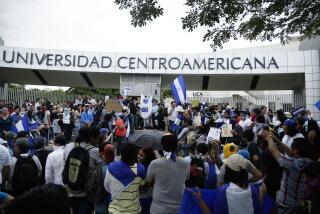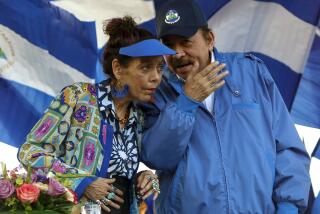Iran-Contra Witness Says He Shifted Funds : Trial: Ex-CIA official says he diverted money to a Nicaraguan ‘entity’ without telling his superior, who is accused of hindering inquiries.
- Share via
WASHINGTON — The government’s main witness in the trial of former top CIA official Clair E. George admitted Friday that he diverted CIA funds to support a Nicaraguan “entity” against the wishes of Congress--without telling George, his superior at the time.
Although the identity of the Nicaraguan “entity” was not disclosed during testimony at George’s trial, a source familiar with the effort said the funds were to support the activities of Archbishop Miguel Obando y Bravo, head of the Roman Catholic Church in Nicaragua and a strong critic of the Sandinista regime.
George is on trial on charges of perjury, false statements and obstruction involving the Iran-Contra affair, in which funds from covert arms sales to Iran were secretly funneled to Nicaraguan Contras.
In cross-examination of Alan D. Fiers, former chief of the CIA’s Central American task force, the admission of the diversion to an “entity” appeared to have two purposes for George’s defense. It could undermine Fiers’ credibility and demonstrate that he was able to bypass George and gain direct access to the late CIA Director William J. Casey, who wanted the covert program funded despite promises to Congress not to do so.
Fiers pleaded guilty a year ago to two misdemeanor charges of withholding information from Congress. His subsequent cooperation with the Iran-Contra independent counsel led to George’s nine-count indictment. Fiers underwent two days of cross-examination this week and faces at least another day next week.
The seven-woman, five-man jury seemed to cling to nearly every word of the exchanges between Fiers and George’s attorney, Richard A. Hibey.
Sitting at the defense table, George often jotted down notes, at one point passing one through another defense attorney to Hibey , who appeared to respond with a question to Fiers.
Under Hibey’s cross-examination, Fiers described how the diversion of CIA funds took place.
He said he tried to persuade the House and Senate Intelligence committees not to cut off funding in fiscal 1986 for, in Hibey’s words, “a non - lethal covert action against the Sandinistas.” A source outside the courtroom said the purpose of the program Hibey referred to was to assist Obando.
There was concern that if the assistance became known, it “could cause problems,” Hibey said, and the CIA’s response was, “ ‘It won’t be blown if you don’t blow it.’ ” When the opposition persisted, Casey promised not to continue the assistance, Hibey noted.
Despite the promise and the cancellation of the appropriation by Congress, “Mr. Casey told you to fix it,” Hibey said to Fiers, who agreed with Hibey’s assessment.
Fiers testified that he first turned to White House aide Oliver L. North for assistance in keeping the program alive and provided North with a bank account number so money could be channeled there. Later, Fiers arranged with a CIA contractor to charge the agency for overhead and other “costs” that actually were diverted to support the Nicaraguan entity, he said.
Fiers’ acknowledgment that he did not relay the information to George, who as deputy director for operations oversaw all CIA covert activities, supported the picture Hibey has been trying to draw of Fiers carrying out questionable activities without George’s knowledge.
Fiers also acknowledged that he and Casey frequently met privately and spoke often by telephone about the work of the Central American task force--particularly in Nicaragua, in which Casey had keen interest.
This direct contact with Casey by Fiers, who was two rungs below George on the CIA ladder of authority, proved “a source of agitation” for George, Hibey noted. The defense lawyer pointed to a CIA routing slip that George sent to Fiers’ immediate boss. With portions underlined for emphasis, it said: “Would you please assure that Mr. Fiers sends all traffic reporting papers to the DCI (director of central intelligence) through this office.”
In a related development, a spokeswoman for independent counsel Lawrence E. Walsh said the office next week would oppose efforts to postpone the trial of former Defense Secretary Caspar W. Weinberger, scheduled to begin Nov. 2.
Lawyers for Weinberger, who was indicted on five felony counts of obstruction and lying in the Iran-Contra case, also are representing Washington attorneys Clark M. Clifford and Robert A. Altman, whose trial in the Bank of Credit & Commerce International scandal was set Friday for Oct. 26.
TRIALS
More to Read
Sign up for Essential California
The most important California stories and recommendations in your inbox every morning.
You may occasionally receive promotional content from the Los Angeles Times.













